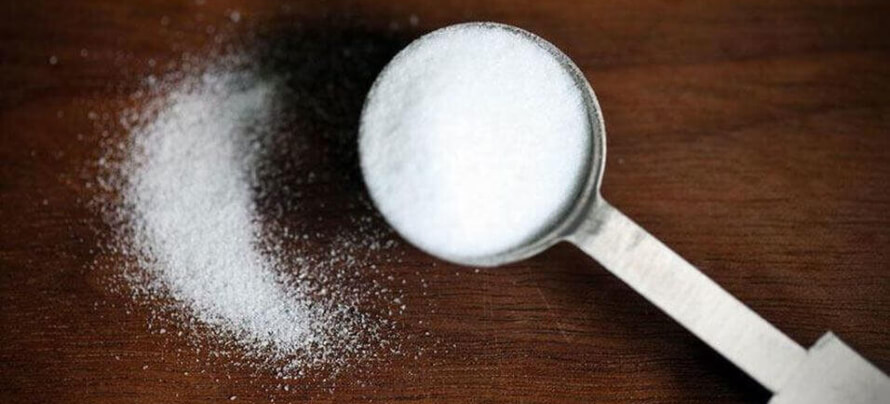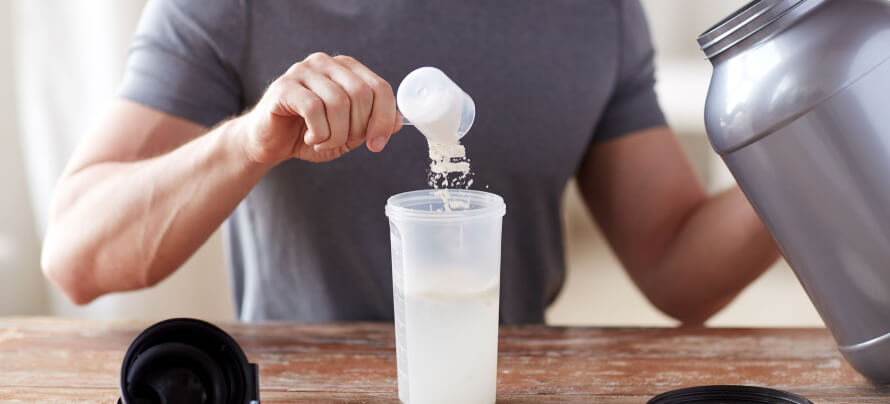Key Takeaways
- Many people say creatine can damage your kidneys because it raises a biomarker that’s associated with kidney damage called creatinine.
- The rise in creatinine levels after taking creatine is entirely natural, and many studies have shown that creatine supplementation is perfectly safe in otherwise healthy people.
- If you want to gain strength, muscle, and power, and you’re otherwise healthy, then you can take large doses of creatine every day without damaging your kidneys (or any other part of your body).
The king of sports supplements.
Creatine is deserving of that title, mostly since steroids are not invited to this particular kingdom. Effective, safe, super cheap and obscenely well researched—creatine just hits all the right notes for songs to be sung of it’s praise.
But where there’s a king, there’s a crown worth vying for.
Beta-alanine tried, didn’t work out so well when a meta-analysis concluded that it’s benefits were quite present but gave it a 2.85% boost as it’s ultimate score. L-citrulline is an up-and-comer as well, but no metas on that bad boy yet.
So creatine seems safe in it’s status as a king.
Just kidding, take it down via slander—viva la revolución. Guillotine and creatine rhyme, not a coincidence.
Seriously though, while finding praise about creatine and its benefits is pretty common online it’s also common to find people claiming falsehoods about it. Either out of ignorance or simply because they’ve heard so much slander before that “creatine” is what sticks out on a label filled with numerous ingredients.
Yes, creatine can boost testosterone.
No, the fact that you have zits on your upper back and newfound anger problems is probably not related to creatine—you sure that preworkout wasn’t laced with something? Sounds more like something ending in -dione and banned by WADA.
Yes, I know there was literally one study on DHT from South Africa by a guy who hasn’t published anything else in nine years since, with no other evidence, but that’s totally sufficient to conclude that creatine CAUSES balding and dedicate entire forums to it (italics mean sarcasm!).
And of course, it’s entirely reasonable to conclude that creatine causes stress to the kidneys because “the kidneys filter it, and adding it to your diet is an unnecessary stress on them.”
Sorry, random blogger, but not only are these gains necessary but that logic applies to literally anything you put in your mouth.
That last one is the topic of this article, and the one that bothers me most, since the connection between creatine and the kidneys is well demonstrated, proven, and easily explainable yet the myth of creatine harming the kidneys still exists. Frickin’ zombie myths, they never die. Now I know why people beat dead horses.
But first, a primer before the smackdown. And, of course, a single olive branch just to be fair.
What Is Creatine?

Creatine is a vital component of our cells, serving as a reserve of energy.
When in a cell, it’s found in the form of creatine phosphate. As its name implies it’s simply creatine and a phosphate chilling together, and it serves as an energy source for cells.
The main cellular currency for energy, ATP, is also known as adenosine triphosphate. It has three phosphate molecules compared to the one phosphate molecule of creatine phosphate. When it gets “used” for energy it loses one of those phosphate groups and becomes simply adenosine diphosphate (ADP.)
ADP doesn’t have the energy potential of ATP, which makes it sad.
Creatine phosphate is a bro though, so he hits ADP up directly with a phosphate to become ATP once more. Glucose can do this as well, but glucose is like the rich overseas parent in this analogy—significantly more potential to help but takes longer to act.
Limited in quantity, but fast acting, creatine then became a sports supplement for this purpose. More energy in a cell means more workout potential, right?
We know it nowadays mostly in the form of creatine monohydrate powder or gummies, the simplest form of supplementation, and it is commonly heralded as the “king” of sports supplements due to its reliability, wealth of studies, and safety.
However, the claims of safety are at times contested. This is seen most commonly in reference to kidney function.
How Do the Kidneys Work?
The kidneys are a pair of organs located in the mid-lower back region.
They are, essentially, filters overseeing the conversion of the liquid in our bodies into urine. Naturally blood and urine differ, and the reason they differ is largely due to how the kidneys decide what should stay and what should go.
The kidneys cycle blood through them and decide what should be kept in the blood and what should be removed and sent to the bladder (which then becomes urine) to be removed from the body. It’s a prolonged, multistage process that’s vital to health. Not even optimal health, just health in general.
Because ultimately, without the kidneys then our urine would just be blood and our blood would be chock full of things that should normally only concentrate in our urine, like ammonia—not a good situation to be in.
The kidneys come up a lot in discussion on dietary supplements because of their overall importance to proper functioning but also due to the fact that, if it can be absorbed past the intestines, then it’s likely removed from the body via the kidneys.
Considering that creatine is one of the most common sports supplements out there, it comes up a lot in discussions about kidney health.
The kidneys, most likely, will be exposed to dietary supplements in high concentrations and repeatedly so it’s important to make sure that nothing we take on a regular basis harms them.
Even though the vast majority of supplements have no evidence to suggest kidney damage, and a surprising number of them have been cleared to be free of harm via scientific studies, it doesn’t stop people from worrying.
And that’s particularly the case with creatine.
Why Do People Think Creatine Damages the Kidneys?

The concerns about creatine and the kidneys stem from initial concerns about protein.
The kidneys have a major workload, and thus can be “taxed.” However, when kidneys get damaged it becomes a “more stress is worse” situation where making them work harder will simply exacerbate and speed up the damage.
The best example of this is protein.
Clinically speaking, people with kidney damage thrive best on diets that are limited in protein intake. This is because amino acids, the building blocks of protein, inherently stress the kidneys a bit when they get processed (at least relative to carbohydrates and fatty acids.)
While normally this is an acceptable stress that the kidneys can recover from easily (and poses no harm) in a damaged state where the kidneys are less able to repair themselves it becomes a “straw that breaks the camel’s back” situation.
While it’s well demonstrated that excessive protein intake harms already damaged kidneys there was concern for a while that protein, inherently, could harm the kidneys—causing a problem as well as accelerating it.
However, studies spanning over a decade in time found that this is seemingly not an issue. Regardless of your protein intake, as long as your kidneys are in a state of good health then protein is not a strong enough insult to cause damage. Damage needs to come from another source, like the process of aging or alcohol abuse.
Now, how does creatine fit into all of this? Two major reasons:
- The “If it’s too good to be true it usually is” mentality.
- The usage of creatinine as a biomarker for kidney damage.
Let’s address the “too good to be true” mentality first.
Creatine and Fear Mongering
While a great rule of thumb, “If it’s too good to be true, it usually is” sometimes gets misused by people trying to “take down” whatever appears to be great just to appear controversial.
Personally, I feel there are many valid reasons to say that creatine isn’t perfect. Creatine non-response, or how some people simply do not get the claimed benefits of creatine due to how their body is, is a great example.
Varying response rates explain why some people gain easily over five or more pounds of muscle while using creatine while others are lucky to gain one pound over a year. Reliability in beneficial effects yet unreliability in magnitude isn’t the best feeling to us nonresponders.
However, rather than this valid example creatine was “linked” to kidney damage seemingly because it had to have something wrong with it and kidney concerns are an easy go-to among worrywarts.
But claims stated without evidence can be dismissed without evidence, which makes it a bit of a predicament when a good chunk of this fear mongering came out of a misinterpretation of actual evidence.
Creatine and Kidney Biomarkers
The biomarker issue, which is more relevant, pertains to creatinine as a metabolite. Note the extra “-ine” at the end of that word, it’s important.
Creatine, when metabolized in the body, will turn into creatinine.
Creatinine is what’s eliminated from the body. As creatine is a vital molecule that always exists in the body then it’s metabolite, creatinine, will always be present in your blood as well.
Creatinine, in particular, is fairly sensitive to kidney issues—insofar that when the kidneys are damaged then a lot more creatinine is reabsorbed into the body than rightfully eliminated. When they kidneys are damaged, blood creatinine levels tend to be increased.
This is why you have creatinine measured when you visit the doctors—it’s a “biomarker” for kidney health. Biomarkers are cheap, efficient, and seemingly reliable ways to determine problems that don’t require more expensive and invasive investigation.
Each biomarker differs and has its own upsides and downsides. Creatinine is pretty reliable under most conditions for indicating kidney damage, with only one exception.
If you consume more creatine than normally expected, more of its metabolite will be produced. This causes a small elevation of blood creatinine levels that, without context, looks indicative of kidney damage at first glance.
Alas, it is a false positive.
While we have reached a state where medical doctors will see high creatinine levels and simply ask you if you’re supplementing with creatine, this wasn’t always the case. It took a lot of time and research for doctors to catch on. Initially, doctors simply saw “sports supplements” linked with this biomarker and, out of prudency, investigated possible kidney damage.
When something is a concern once it remains a scar on the molecule’s reputation forever etched online, much like how initial concerns about saccharin being linked to bladder cancer have been shown to be overblown yet still reverberate in many blogs.
However, rest assured, that scientifically speaking all the above are non issues.
What Have Studies Found?

I’ll skip over the rat data on this topic since, aside from some species differences between us and rats on this topic, we have a wealth of human data.
The human studies tend to focus on a biomarker called “Glomerular Filtration Rate” (GFR), a measure of how fast and efficiently the kidneys can function. Creatinine is out of the question due to the false positive issue.
When it comes to young and healthy demographics, people who are most likely to use creatine, supplementation of 5 to 10 grams a day has been found to not have any significant harm to kidney function. This safety also extends to older individuals, about 60 years old.
What about demographics that aren’t generally seen as “healthy?”
Creatine has been tested at least three separate times for the treatment of amyotrophic lateral sclerosis (ALS). While creatine was hypothesized to be beneficial for ALS, and the studies ended up being lacklustre, all three showed no harm to the kidneys.
While ALS isn’t a condition that’s classically associated with kidney damage, type II diabetes is—surprisingly creatine is without harm even in this condition. At least one study even used a moderate dose of two grams creatine a day in hemodialysis (the machine that cycles blood for you when you have kidney failure) without any harm.
The kidneys were already a lost cause in the hemodialysis example, but a case study of a man who had a single kidney who did not suffer any negative effects from a standard loading protocol of 20 grams for five days (followed by 5 grams for a just under a month) is perhaps more relevant.
Even with a loading protocol placed on a single kidney we have evidence that there is no major harm.
So, does this mean creatine is 100% not to blame for any health problems?
Mostly, yeah, but not in every case.
Is There any Concern?
For people with healthy kidneys, there’s no reason to worry about taking creatine.
For people with only one kidney, the current evidence suggests there’s no reason to worry.
For most people with already damaged kidneys, the current evidence suggests there’s no reason to worry.
Most.
At this moment in time the only theoretical side-effect of creatine pertains to the combination of kidney issues and water retention—in particular, focal segmental glomerulosclerosis (FSGS) as assessed by this case study.
While normally case studies linking creatine to kidney damage are pretty weak in design (people report using “sports supplements” and have kidney damage yet no timeline or connection is made beyond what can be seen as coincidence) this one is fairly strong.
The subject in question, with the disease state, had a worsening of GFR when creatine was introduced and, when creatine was stopped, GFR tended to start to improve itself. A sound argument for creatine causing the changes in GFR.
The reason this particular kidney state is notable is because it causes a large degree of edema, or water retention, and the water retention itself can be damaging. In situations where excess water retention causes damage then diuretics (which promote urination) are given.
Creatine retains water, which can make these problems worse.
This topic hasn’t been further investigated but it leaves us with a good rule of thumb for the only potential downside of creatine—if you have a medical condition for which you are prescribed diuretics then don’t take creatine as they do opposite things to the body’s water content.
This warning also applies to other things that retain water, such as sodium and potentially other osmolytes (water content regulators) like creatine such as taurine and betaine.
I would also wager this warning applies to people using diuretics to treat high blood pressure, since water retention seems to be a problem in these people.
Prescribed diuretics overrule creatine, but if that’s not a concern then you should be good to go.
The Bottom Line on Creatine and the Kidneys
At the end of the day, the inception of this myth was caused by a poorly understood (at the time) link between amino acids and the kidneys.
The perpetuation was likely due to the nature of there being a false positive, unnecessary prudence and caution, all topped off by the “if it’s too good to be true, it usually is” mentality ironically not paying attention to the “usually” in that saying.
Excluding some potential stomach ache and diarrhea that comes from taking too much creatine at once, usually with inadequate fluids, there are no proven or well established harms of this dietary supplement.
In other words, a mountain of evidence shows that taking creatine isn’t going to damage your kidneys as long as you’re otherwise healthy. And it probably won’t hurt your kidneys even if you’re unhealthy.










